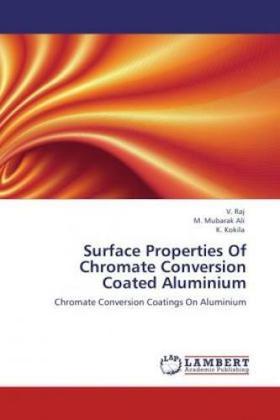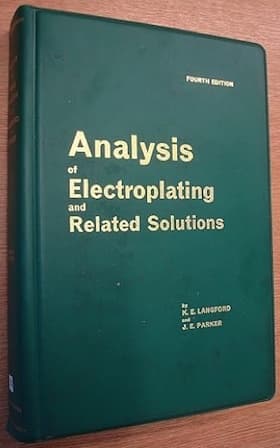
Curated with aloha by
Ted Mooney, P.E. RET

The authoritative public forum
for Metal Finishing 1989-2025

-----
Alodine 600 Composition, Analysis, sulphate and Chloride Contamination
Q. Could someone give me some direction on where I might find a procedure for checking sulphate and Chloride levels in "Alodine 600"?
Thank you,
Perry Lambert- Arkansas
2001
A. Try Volumetric Analysis of Metal Finishing Solutions [on Amazon affil links] by Andrew McFadyen.

James Totter, CEF
- Tallahassee, Florida
2001
Q. I need to know which are the chemical components and their percentages for the Alodine 600, does it have Nickel, how much? etc. We would really appreciate your fast response .
Best regards,
CARLOS VAN SANTEN- REYNOSA, TAMAULIPAS, MEXICO
2003
A. Hi Carlos. This is a proprietary product for chromate conversion coating with a trade secret formulation; it is difficult for anyone who might know the composition to know what parts of the composition are public vs. trade secret, but I doubt that it contains nickel. You could start by requesting a tech data sheet and MSDS from Henkel, which will probably tell you what you need to know. Good luck!

Ted Mooney, P.E.
Striving to live Aloha
finishing.com - Pine Beach, New Jersey
2003
Multiple threads merged: please forgive chronology errors and repetition 🙂
by Raj & Ali

on AbeBooks
or eBay or
Amazon
(affil links)
Q. Hi everybody!
I need Alodine 600 specs. What is the formula? What is the principal component? How and where could it be bought? I read here that Alodine 600 formula is confidential, so, how can I know that my plating supplier is using Alodine 600?
Regards,
Dany O PortalesMetal Products - Monterrey, NL, Mexico
2003
A. You do a Quality audit. Check his purchasing records, his analysis methods and records, his process control and routing sheets. He really should have a copy of the operations sheet from the manufacturer. Check to see if his analysis methods and results are in line with the Ops sheet. A computer search engine will find the contact information for the manufacturer who would probably be happy to send you information since you spec their product. They can also tell you who is the nearest sales agent.
James Watts- Navarre, Florida
2003
Q. I have a requirement to test my Alodine 600 solution for total chlorides and sulphates monthly. I need a procedure/instructions on how to do this and what equipment I will need.
James S [last name deleted for privacy by Editor]aerospace - Lewisville, Texas
2005
2005
A. Without knowing how good your lab is, I'm going to recommend ISE (ion specific electrode) since chlorides and sulphates would be contaminants in Alodine 600, and as far as equipment is concerned get specific recommendations from your favorite lab supply house for electrodes, meters, etc.
There are other ways to measure for these contaminants (titrate for chloride, gravimetric for sulphate), but I don't know what concentrations you're looking for.

James Totter, CEF
- Tallahassee, Florida
by Langford & Parker

on Abebooks
or Amazon
(UTL on eBay)
(affil links)
Q. Dear all
We like to test our Alocrom 1200 solution that we use for aluminium treatment by titration method. I'll be grateful if you could let me know how do you carry out the titration test.
best wishes,
- Bristol, UK
2006
-- appended to this thread by editor
July 31, 2017
A. PROCEDURE NO.: E-3
PROCESS: ALODINE 600, 1200S SOLUTIONS
DETERMINATION: Trace Anions in Alodine Solutions (Cl-, SO 4 = and PO 4-3 ).
EQUIPMENT:
a.Dionex Ion Chromatograph or equivalent.
SYSTEM SET-UP: a.COLUMNS: i)GUARD: Dionex OmniPac PAX-100 or equivalent. ii)SEPARATOR: Dionex OmniPac PAX-100 or equivalent.
b.SUPPRESSOR: Anion Micromembrane Suppressor i)AUTOREGENERANT: 25 mN H 2 SO 4 ii)FLOW RATE: approx. 8 ml./min @ reagent outport
c.ELUANTS: i)ELUANT#1: DI H 2 O ELUANT#2: 50% (v/v) CH 3 CN ELUANT#3: 100 mN NaOH ELUANT#4: N/A in a ratio of: #1 45% / #2 10% #3 45%
ii)FLOW: 1 ml/min
d.DETECTOR: Conductivity
i)BACKGROUND: approx. 4.0 µS ii)OUTPUT RANGE: 30 µS iii)SCALE: 30000 nS
SAMPLE PREPARATION: 1:1000 dilution with DI H 2 O
STANDARDS: F-/ Cl-/ NO 3-/ SO 4 = / PO 4-3 in CrO 3 i)LEVELS: 3
- Auburn, Washington USA
Gravimetric analysis of sulphates in Alodine 600
November 14, 2019Q. Hi,
Please see below the procedure I use for gravimetric analysis of sulphates in Alodine 600:
1. Take 100 ml sample of solution.
2. Add 100 ml of DI water and 50 ml of 1:1 HCl.
3. Carefully drop in 50% v/v H2O2, mixing thoroughly during the addition. When the reduction is complete, the further addition of H2O2 will cause no foaminess and the solution will be a clear bluish-green.
Allow the gassing to decrease, stir well and check for complete reduction by adding a few more drops of 50% v/v H2O2.
4. Heat to a near boil and slowly add 25-30 ml of 10% BaCl2 drop by drop until no more precipitate is formed. Boil for an hour longer, add hot water to make about 200 ml, remove from hot plate and let stand for 4-5 hours, preferably overnight.
5. Filter the solution through weighed glass filter, fine ("F", "4") porosity, with a maximum pore size of 5 micron or equivalent weighed fiberglass filter paper. Wash precipitate with small portion of warm DI water until washings are free of chloride, as indicated by testing with AgNO3/HNO3 reagent.
6. Dry the filter and precipitate in the oven at 110 degree C for 2-3 hours. Cool in a desiccator and weigh. Dry in oven again to constant weight.
Calculation: SO4 g/L = g BaSO4 x 4.116.
I checked this procedure on standard solutions of chromic/sulfuric acids. The results were very close to prepared concentrations.
Henkel (Alodine manufacturer) in Alodine 600 TDS has no limits for sulphate contamination in solution, no requirements to check it and no analysis' procedure. The only customer who request this analysis (as I know) is Boeing with operating limit of 200 ppm maximum.
When I checked our Alodine 600 solution, I found sulphate concentration at around 500 ppm, like Erwin.
We use nitric/chromic/fluoride deoxidizer and have no solution with sulphates on all Alodine line, so there is no place for drag-in from anywhere.
I prepared new Alodine 600 solution in my lab and found sulphate concentration at around 500 ppm, again.
I had a number of talks with our local Henkel representatives asking them to clarify with Henkel, may be there is some component of solution (other than sulphate), which will be precipitated by BaCl2; or asking them to give me another procedure for analysis of sulphate - no answer until now.
So please, Alodine 600 users, do you have the same problem? Do someone have another procedure? Do someone have any idea how to solve this problem?
Thank you for your help
Alex
- Lod, Israel
Q, A, or Comment on THIS thread -or- Start a NEW Thread